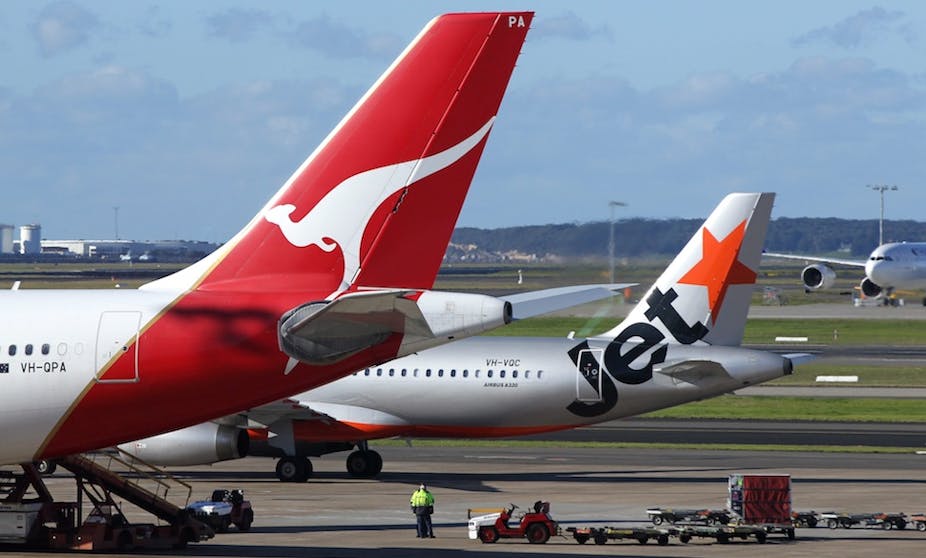Qantas and its low cost carrier division Jetstar have announced they will increase domestic and international airfares in stages from February through to July 1. The justification is a combination of increasing oil prices and the introduction of the federal government’s carbon tax, which kicks in from July.
On the surface, the issue appears fairly straightforward. Increased costs of providing a service is being passed onto consumers. However, pricing in the airline industry is not always as simple as it appears.
For all airlines, fuel is a major component of their cost structure. Fuel represents about 40% of Qantas’ costs and close to 60% of Jetstar’s overall costs, according to Dr Tony Webber, Qantas’ former chief economist who spoke to my airline and transport management students in 2010.
In common with most major airlines, Qantas and Jetstar have hedging agreements with oil companies in which the cost of fuel is maintained at an agreed level for an agreed period of time, usually a year.
This means that irrespective of crude oil price movements during the agreed period, airlines continue to pay the fixed rate. In other words, an increase in air fares may actually increase revenue during the hedging period when market crude oil prices increase.
The other factor in the planned fare increase, the carbon tax, will in all likelihood be charged in the ticket price as a tax. As a government imposed tax it will be added to the cost of a ticket but will not be commissionable to retail travel agents.
Since the Qantas announcement, its competitors, notably Virgin Australia, have demurred from announcing any similar air fare increase although we can only speculate about when and if this will occur. From a strategic perspective some may question the wisdom of flagging an air fare increase well in advance of its implementation.
One perspective is that it presents a window of opportunity for the airline and travel retailers to sell to passengers keen to purchase airline tickets at the pre-increase rate. This creates a spike in sales and significant advance cash flow into Qantas and Jetstar which can be invested by the airlines.
Both Qantas and economists have suggested that the increases could add as much as $60 to the price of a domestic ticket and as much as $300 to the price of a long haul international ticket. However, as the proposed increases have not been fully quantified, much will depend on the response of Qantas’ and Jetstar’s competitors. On competitive routes such as Australia-London or Melbourne-Sydney-Brisbane domestic routes, competitive pressures are likely to moderate air fare changes, forcing airlines to absorb at least some of the increased costs.
The carbon price will impact on all airlines operating within, to and from Australia. While it is possible to speculate on what portion of the tax is passed onto consumers by each airline it is likely that at least some if not all will be. Revenue from the carbon price which applies to selected industries including airlines is expected to be substantial and the key basis of the Gillard government’s planned budget surplus for the 2012-13 financial year is based on revenues from the carbon price, even with its compensatory features.
From a political perspective, the implementation of a carbon price, however politically contentious it may have been, makes it difficult to change. Many businesses will be forced to factor the carbon price into their cost structures as is already occurring with energy providers.
The history of tax in Australia demonstrates that once a tax has been implemented, governments are loath to wean themselves from a cash cow. A graphic example of this was the introduction of the GST over 10 years ago by the Howard coalition government.
The GST was bitterly opposed by the then Labor opposition (despite the fact that it was originally proposed by Paul Keating when he was Treasurer but rejected by the ALP) but never repealed.
Federal Opposition Leader Tony Abbott, may gain political capital from railing against the carbon tax and promising to repeal it. However, the likelihood of a future government led by Abbott actually doing so is remote because he would be forced to address an alternative revenue stream, despite his claims of funding a repeal through savings.
One doesn’t need to Nostradamus to predict that Abbott, if elected in 2013, will engage in dexterous verbal gymnastics to explain how the carbon price cannot be repealed immediately, if ever.
He’ll always be able to blame the Senate. Irrespective of which party is elected to government in 2013, the Greens who support a carbon price hold the balance of power.
An earlier version of this story stated Qantas and Jetstar price rises will begin on July 1. The price rises will begin in February through July. The story has been amended.

